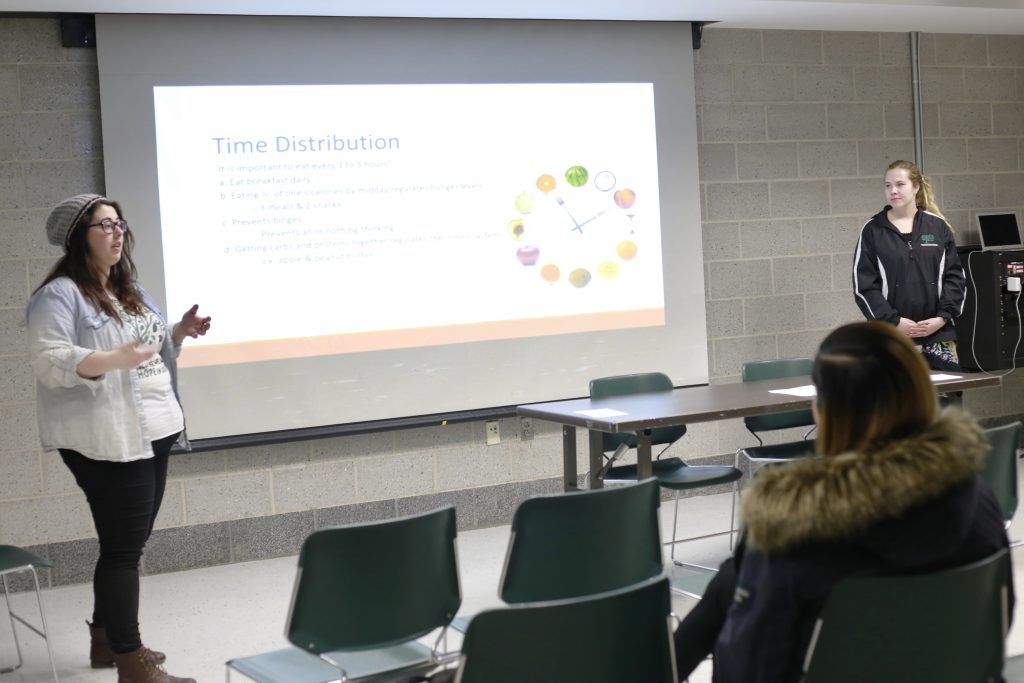
Binghamton University’s Mental Health Outreach Peer Educators (M-HOPE) discussed ways to destigmatize mental health, find healthy and nutritious ways to eat on campus and help peers feel more comfortable using resources available to them.
The event was held on Wednesday evening through the Mental Health Advocacy (MHA) series titled “Nutrition, Body Image and Eating Disorders.” The M-HOPE interns discussed the characteristics of healthy eating, the behaviors of eating disorders to watch out for and the need to speak openly about seeking help for those who notice these behaviors in their peers.
One such resource, the University Counseling Center, provides clinical and referral services to BU students in order to enhance the overall psychological well-being across campus. Sargunvir Sondhi, and M-HOPE intern and a junior majoring in biology, discussed some of the goals of the MHA program, such as reducing anxiety about seeking out counseling services.
“The main reason students do not approach the counseling center is because of the stigma surrounding it,” Sondhi said. “Our main goal throughout campus is to encourage students, if they need to, to approach the counseling center and get the help they need.”
Lauryn Maleski, an M-HOPE intern a sophomore majoring in human development, discussed the important role variety plays in creating a balanced diet. She and the other interns explained that it is important to consume processed foods in moderation and to get a majority of your vitamins and minerals from natural foods, such as fruits and vegetables.
The event attendees participated in an activity where each person tried to create a virtual meal that encompassed all the aspects of the United States Department of Agriculture’s standards for a healthy plate, including fruits, vegetables, whole grains, protein and dairy.
“Variety is really important,” Maleski said. “It is good to go with different colors and textures and to think about that as you are creating meals so you can target different nutrient areas and make sure you are fully nourishing your body in all aspects.”
Charlotte Crinnin, an M-HOPE intern and a sophomore majoring in psychology, explained that it is good to eat throughout the day in order to avoid binges and aid your body in the digestion process.
“You can find yourself in a binge cycle,” Crinnin said. “Afterward, you often feel guilty or remorse, and then you want to try and get in control and you start the cycle over again. It’s hard to escape because it has emotional and health components tied in.”
Bridget Jules, an undeclared freshman, said she chose to come to the event because she is interested in psychology as well as mental health advocacy.
“There are a lot of people that can benefit from these things,” Jules said. “It’s just that some people might think that mental health is made up and don’t experience genuine issues from it. Having an educational series about it is really interesting. I want to encourage people who are not as informed to come to these things.”
The M-HOPE interns said they hope to spread their message to the student body at the University and, through talking to students about nutrition and body image, explain why it should not be a taboo topic. They want to promote positive body image and help others look for warning signs if a friend is experiencing some kind of issue with nutrition.
“This particular event, and events that we do about depression and anxiety, are really important because a lot of students in our demographic experience these things,” Maleski said. “A lot of our friends experience them. A lot of the people we see in class, you wouldn’t even know the stuff they are going through, so facilitating a conversation about these particular topics is a way for people to re-evaluate, ‘What can I do to help myself and my friends?’ and doing that healthily.”


